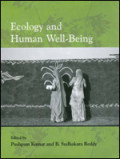
Ecology and Human Well-Being
The contribution of ecology for human well-being remains blurred in decision-making trathecodes, although its impact on societal well-being is profound. This volume presents some of the latest deve…
- Edisi
- Ed. 1, Cet. 1
- ISBN/ISSN
- 978-0-7619-3553-7
- Deskripsi Fisik
- xxv, 404 hal.; ilus.; 19 x 24,7 cm. indeks.
- Judul Seri
- -
- No. Panggil
- 577 KUM e
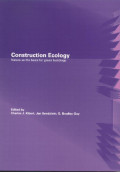
Construction Ecology: Nature as the Basic for Green Buildings
Designers of the built environment have much to learn from nature and Industrial ecology as they focus increasingly on green or sustainable construction. Natural systems are the ideal model not onl…
- Edisi
- Ed. 1, Cet. 1
- ISBN/ISSN
- 978-0-415-26092-3
- Deskripsi Fisik
- xxiv, 305 hal.; ilus.; 17 x 24,4 cm.; indeks.
- Judul Seri
- -
- No. Panggil
- 720.4 KIB c
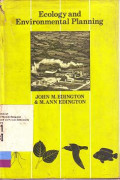
Ecology and Environmental Planning
In its broadest sense environmental planning is an attempt to balance and harmonise the various enterprises, which man, for his own benefit, has superimposed on natural environments. Although these…
- Edisi
- Ed. 1, Cet. 1
- ISBN/ISSN
- 0-470-99262-x
- Deskripsi Fisik
- 246 hal.; ilus.; 16 x 23,8 cm.; indeks.
- Judul Seri
- -
- No. Panggil
- 696 EDI e
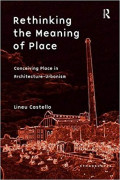
Rethinking the Meaning of Place: Conceiving Place in Architecture-Urbanism
The spread of newly 'invented' places, such as theme parks, shopping malls and revamped historic areas, necessitates a redefinition of the concept of 'place' from an architectural perspective. In t…
- Edisi
- Ed. 1, Cet. 1
- ISBN/ISSN
- 978-0-7546-7824-4
- Deskripsi Fisik
- xx, 256 hal.; ilus.; 16 x 24 cm.; indeks.
- Judul Seri
- -
- No. Panggil
- 304.2 CAS r
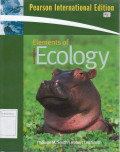
Elements of Ecology
The first edition of Elements of Ecology appeared in 1976 as a short version of Ecology and Field Biology. Since that time, Elements of Ecology has evolved into a textbook in- tended for use in a o…
- Edisi
- Ed. 7, Cet. 1
- ISBN/ISSN
- 978-0-321-56147-3
- Deskripsi Fisik
- xvi, 720 hal.; ilus.; 21,6 x 27,5 cm.; indeks.
- Judul Seri
- -
- No. Panggil
- 577 SMI e
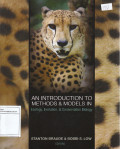
An Introduction to Methods & Models In: Ecology, Evolution and Conservation B…
This unique textbook introduces undergraduate students to quantitative models and methods in ecology, behavioral ecology, evolutionary biology, and conservation. It explores the core concepts share…
- Edisi
- Ed. 1, Cet. 10
- ISBN/ISSN
- 978-0-691-12723-1
- Deskripsi Fisik
- xiii, 267 hal.; ilus., 20,3 x 25,4 cm.; indeks.
- Judul Seri
- -
- No. Panggil
- 577 BRA i
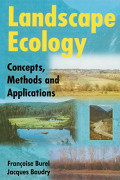
Landscape Ecology: Concepts, Methods and Applications
The book covers the major concepts, the methods of spatially explicit analyses from an ecological perspective, and the factors of landscape dynamics having ecological implications. The authors expl…
- Edisi
- Ed. 1, Cet. 2
- ISBN/ISSN
- 2-7430-0305-7
- Deskripsi Fisik
- xvi, 362 hal.; ilus.; 15 x 23,3 cm.
- Judul Seri
- -
- No. Panggil
- 577 BUR l
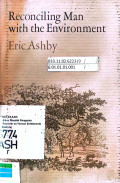
Reconciling Man With the Environment
The book "Reconciling Man with the Environment" by Eric Ashby is based on a series of three lectures delivered at Stanford University in October 1977. It explores the complex relationship between h…
- Edisi
- Ed. 1, Cet. 1
- ISBN/ISSN
- 0-19-858327-3
- Deskripsi Fisik
- vii, 104 hal.; ilus.; 14,8 x 21,7 cm.; indeks.
- Judul Seri
- -
- No. Panggil
- 304.2 ASH r
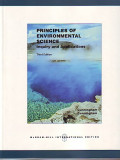
Principles of Environmental Science: Inquiry and Applications
Principles of Environmental Science: Inquiry and Applications provides a comprehensive overview of the fundamental concepts and methodologies in environmental science. This text emphasizes the impo…
- Edisi
- Ed. 3, Cet. 1
- ISBN/ISSN
- 0-07-111574-9
- Deskripsi Fisik
- xviii, 428 hal.; ilus.; 23 x 27,5 cm.
- Judul Seri
- -
- No. Panggil
- 570.5 CUN p
Green Cities of Europe: Global Lessons on Green Urbanism
In the absence of federal leadership, states and localities are stepping forward to address critical problems like climate change, urban sprawl, and polluted water and air. Making a city fundament…
- Edisi
- Ed. 1, Cet. 1
- ISBN/ISSN
- 978-1-59726-974-2
- Deskripsi Fisik
- 233 hal.; ilus.; 15 x 23 cm.; indeks.
- Judul Seri
- -
- No. Panggil
- 307.76 BEA g



 Karya Umum
Karya Umum  Filsafat
Filsafat  Agama
Agama  Ilmu-ilmu Sosial
Ilmu-ilmu Sosial  Bahasa
Bahasa  Ilmu-ilmu Murni
Ilmu-ilmu Murni  Ilmu-ilmu Terapan
Ilmu-ilmu Terapan  Kesenian, Hiburan, dan Olahraga
Kesenian, Hiburan, dan Olahraga  Kesusastraan
Kesusastraan  Geografi dan Sejarah
Geografi dan Sejarah